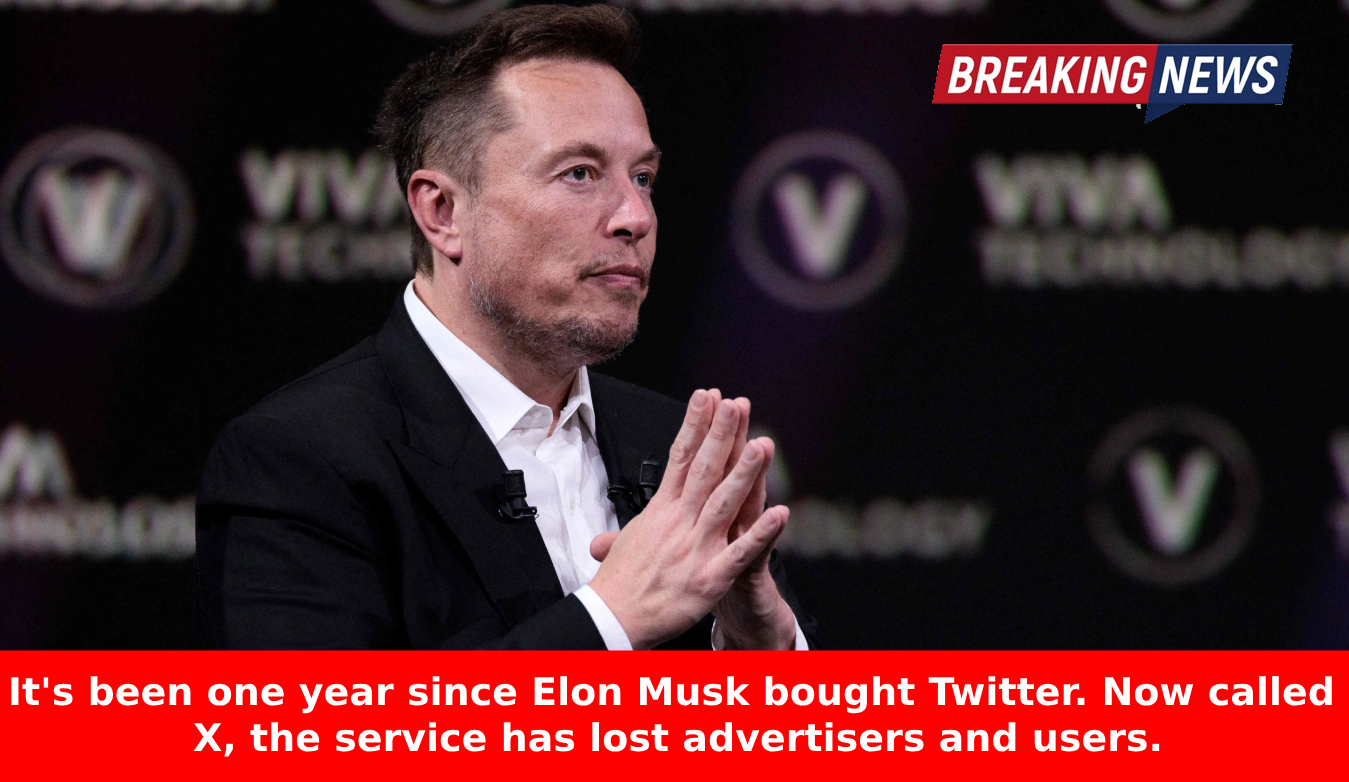It's been one year since Elon Musk bought Twitter. Now called X, the service has lost advertisers and users.
It's been a year since billionaire Elon Musk strolled right into Twitter's San Francisco head office with a white bathroom sink and a smile, and, as its new owner, terminated its CEO and various other top executives as the primary step in transforming the social networks system.
In the process, Musk provided Twitter a brand-new name, X, together with a brand-new approach. Even as X looks something like Twitter, the more time you invest in it the clearer it ends up being that it's merely an estimation.
Musk has dismantled core attributes of what made Twitter, Twitter-- its name and blue bird logo, its verification system, its Trust fund and Safety and security consultatory team. In addition to content moderation and hate speech enforcement. He likewise fired, laid off or lost the majority of its labor force-- designers that keep the site running, mediators that keep it from being overwhelmed with hate, execs in charge of making regulations and enforcing them.
As a business, X is additionally much from its previous incarnation, with the service having actually lost droves of advertisers and users. Some firms have backed away from the service amid worries regarding its material and hate speech, while some users have grown disappointed for comparable reasons.
The solution has seen a 30% decline in the number of individuals actively tweeting, the Washington Post reported.
According to Aisha Counts, a press reporter from Bloomberg News, marketers have actually left as a result of the decrease in the quality of web content on the website. She notified CBS News that marketing saw a substantial decline of 60% in September.
It's been one year since Elon Musk bought Twitter. Now called X, the service has lost advertisers and users.
According to her, it shows up that earnings and advertising and marketing have both decreased, suggesting that it may not be a smart monetary decision.
"Everything application"
The result, long-term Twitter watchers state, has actually been completion of the system's function as an incomplete but helpful area to find out what's going on in the world. What X will come to be, and whether Musk can achieve his passion of turning it right into an "everything application" that everybody utilizes, stays as uncertain as it was a year ago.
"According to Jasmine Enberg, an analyst at Expert Knowledge, Elon Musk has actually stopped working to deliver any kind of substantial enhancements to the platform, and his goals for an 'whatever app' continue to be unfulfilled. X has pushed away individuals, advertisers, and has shed its standing as a best source for news in the social media landscape."
It's been one year since Elon Musk bought Twitter
As one of the platform's most popular and respected customers even prior to he got the firm, Musk had a distinct experience on Twitter that is considerably various from how regular individuals experience it. Yet much of the modifications he's presented to X has been based upon his own impacts of the site-- in fact, he also polled his millions of followers for advice on how to run it (they stated he ought to step down).
Part of his inspiration for buying Twitter was that he simply likes the application, Counts kept in mind, adding, "I think he was tweeting at 1 a.m. this morning"
She added, "The long term vision is to transform it right into a whatever app or very app, which is adding settlements, like shopping ... however there's a lengthy roadway to get there."
Enberg specified that the main reason for Twitter's downfall has actually been their effort to change the platform from a social network into a technology business.
Blue checkmarks and false information
Heaven checkmarks that when symbolized that the person or organization behind an account was that they claimed they are-- a celebrity, professional athlete, journalist from worldwide or regional magazine, a not-for-profit company-- currently merely reveals that somebody pays $8 a month for a registration solution that increases their articles over un-checked users. It's these paying accounts that have been located to spread out false information on the system that is typically magnified by its formulas.
On Thursday, for example, a new report from the left-leaning not-for-profit Media Matters found that numerous blue-checked X accounts with tens of thousands of followers asserted that the mass shooting in Maine was a "false flag," intended by the federal government.
Researchers additionally found such accounts spreading out false information and publicity concerning the Israel-Hamas war-- a lot so that the European Payment made a formal, legitimately binding ask for details to X over its handling of hate speech, misinformation and fierce terrorist content pertaining to the battle.
This month, Ian Bremmer, a well-known expert in diplomacy, took to X to express his concern regarding the spread of misinformation on the Israel-Hamas dispute. He mentioned that the platform's mathematical promotion of false info was extraordinary in his job as a political scientist.
The financial problems of X
The unpredictability surrounding the system's track record is not the only concern. Twitter was already encountering economic troubles before Musk's purchase for $44 billion on October 27, 2022, and the situations seem much more perilous now. Musk made the firm personal, thus the monetary information are no longer obtainable to the public. Nonetheless, in July, the CEO of Tesla mentioned that the business's marketing income had decreased by around 50% and it is still strained with a considerable amount of financial obligation.
"We're still negative cash flow," he published on the site on July 14, as a result of an around a "50% drop in marketing profits plus heavy debt tons."
"Need to reach favorable capital prior to we have the high-end of anything else," he claimed.
In Might, Musk worked with Linda Yaccarino, a former NBC executive with deep ties to the marketing sector in an attempt to lure back top brands, but the effort has actually been sluggish to repay. While some advertisers have gone back to X, they are not investing as high as they carried out in the past-- regardless of a rebound in the online marketing market that enhanced one of the most current quarterly earnings for Facebook parent business, Meta, and Google parent business, Alphabet.
According to Insider Intelligence, X's advertising profits is expected to reach $1.89 billion this year, representing a 54% decrease from 2022's number of $4.12 billion. This year's projected income is similar to the $1.99 billion tape-recorded in 2015.
Outside study likewise reveals that individuals are using X much less.
A recent research by Similarweb disclosed that Twitter's international web traffic has decreased by 14% contrasted to the same duration last year, with a 16.5% drop in web traffic to the platform's ad website. The decline in mobile website traffic was even more obvious, with a 17.8% year-over-year decline based upon the consolidated month-to-month active individual base for iOS and Android.
"Even though the cultural relevance of Twitter was currently starting to decline," before Musk took it over, "it's as if the system no more exists. And it's been a death by a thousand cuts," Enberg said.
Twitter takeover: 1 year later, X struggles with advertising











.jpg)





